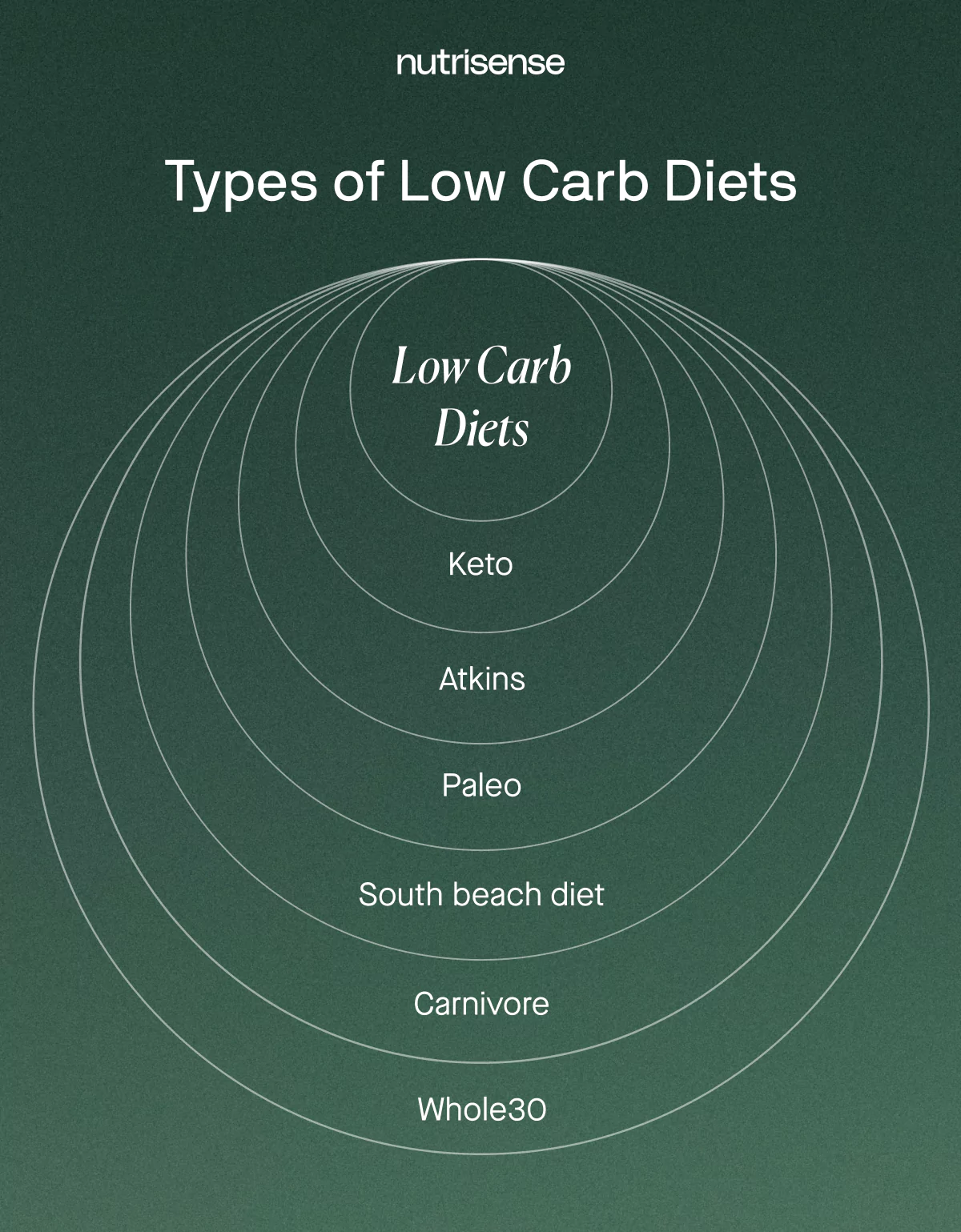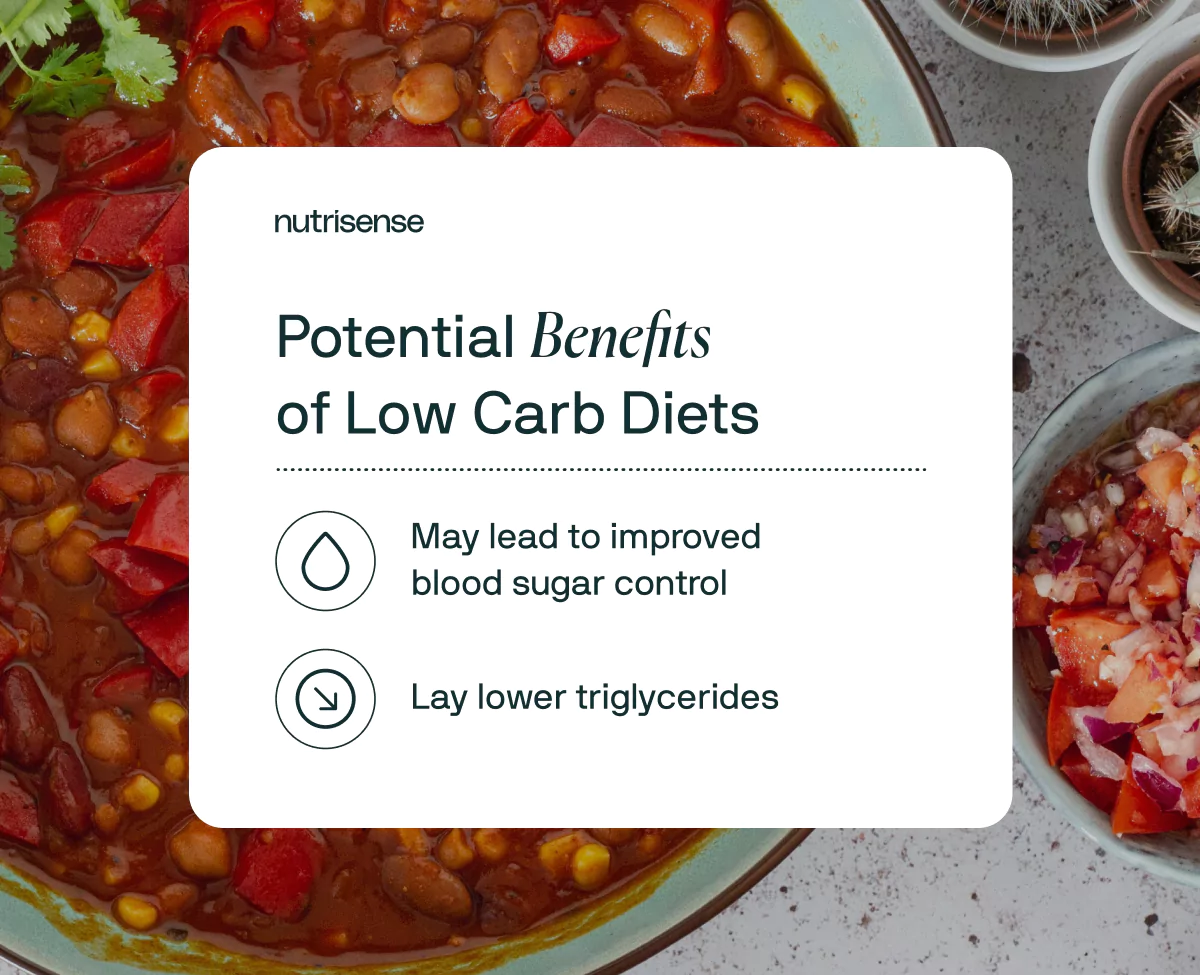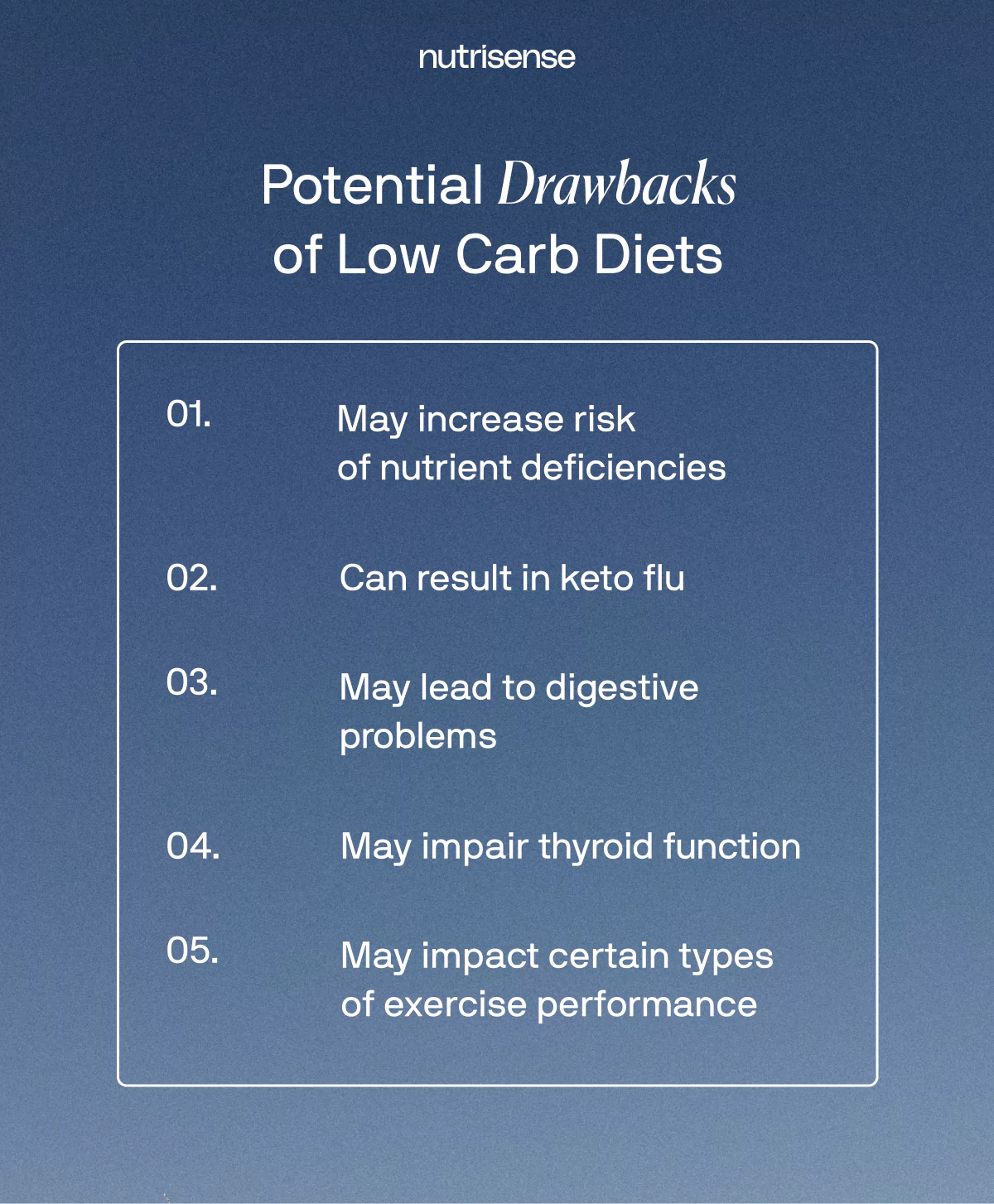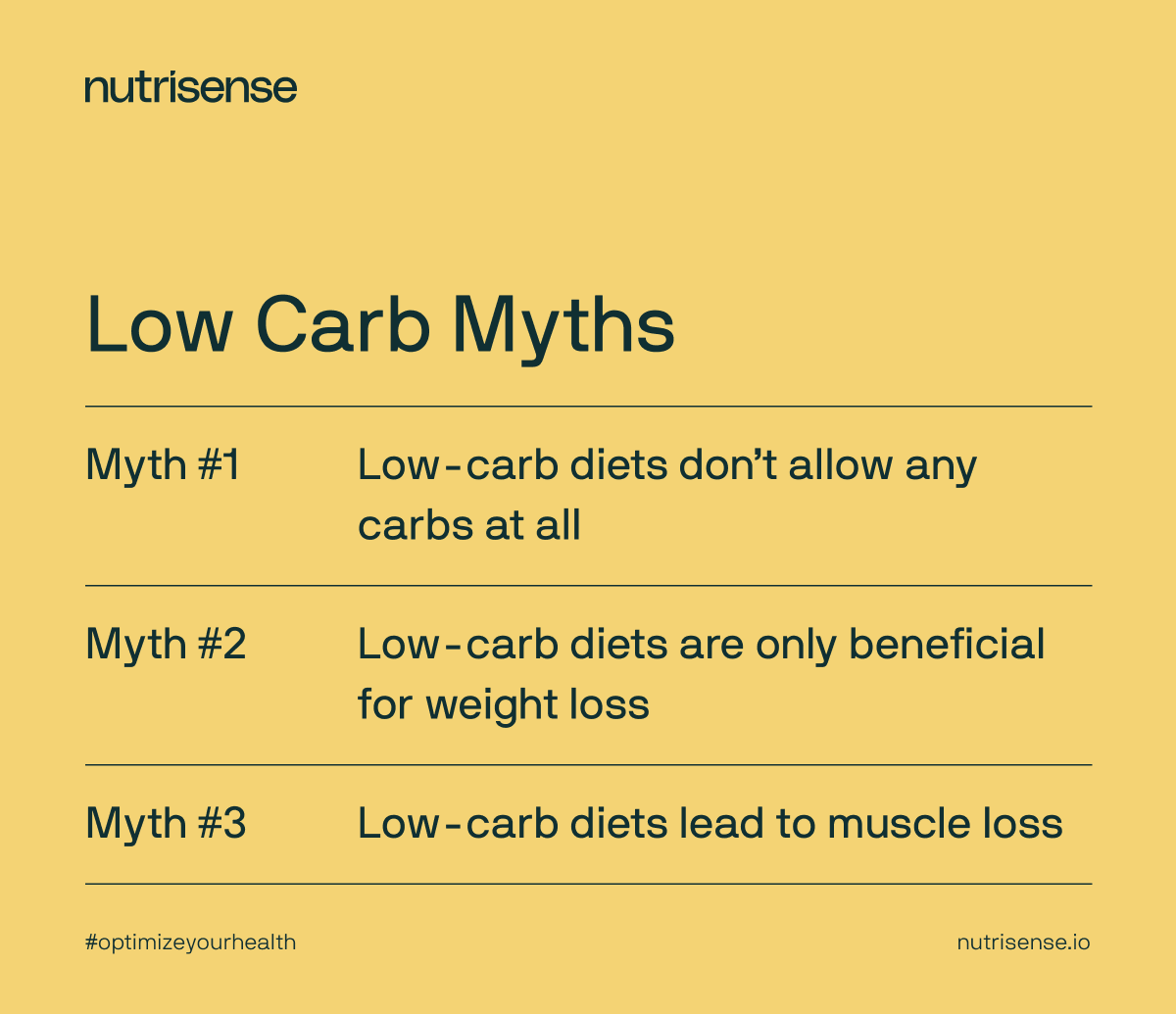Low-Carb Diet Guide: Benefits, Risks, and Daily Limits

Key Takeaways
- Daily Carb Limit: Most low-carb diets suggest limiting intake to 50g–130g of carbohydrates per day, though individual tolerance varies.
- Metabolic Impact: Reducing refined carbs can improve glucose variability and metabolic flexibility.
- Not Just Weight Loss: Beyond the scale, benefits include stable energy levels and support for A1C management.
- Bio-Individuality: The "right" amount of carbs depends on your body's unique response, which tools like a CGM can help you measure.
- Daily Carb Limit: Most low-carb diets suggest limiting intake to 50g–130g of carbohydrates per day, though individual tolerance varies.
- Metabolic Impact: Reducing refined carbs can improve glucose variability and metabolic flexibility.
- Not Just Weight Loss: Beyond the scale, benefits include stable energy levels and support for A1C management.
- Bio-Individuality: The "right" amount of carbs depends on your body's unique response, which tools like a CGM can help you measure.
While low-fat diets once reigned supreme in the landscape of American dieting practices, low-carb diets have emerged over the last few decades as one of the most popular diet trends in the Western world.
Factors like losing weight, boosting metabolic health, and improving overall well-being are often top of mind for anyone on this type of eating plan, which is why so many people have started implementing low-carb diets into their lifestyles. But do low-carb diets actually offer these kinds of benefits?
Let’s take a deeper look at what types of diets can be classified as “low-carb” and potential benefits, risks, and myths you should know about low-carb diets for your health.
Understanding Low-Carb Diets

Following a low-carb diet involves more than merely cutting back on pizza and pasta. It is a nutritional strategy that limits carbohydrate intake—typically to less than 26% of total daily calories—to optimize metabolic efficiency.
How Many Carbs is "Low-Carb"
It depends, but generally 50g to 130g per day. While definitions vary, a standard low-carb diet sits below 130 grams of carbohydrates daily. Dropping below 50 grams typically pushes the body toward ketosis. However, the ideal threshold is bio-individual; some people maintain stable glucose levels at 100g, while others may need to go lower.
A low-carb diet encourages the body to utilize stored fat for energy requirements, supporting metabolic flexibility. As a result, many choose this approach for weight management. Additionally, reducing carbohydrate intake can be a powerful tool for lowering A1C levels and supporting healthy blood glucose regulation.
Though more research is needed to understand the potential impact, some proponents of low-carb diets also believe that this type of eating plan can have cardiovascular benefits such as:
- Increase HDL cholesterol
- Lower blood pressure
- Lower triglycerides
While there’s no specific guidelines for the amount of carbohydrate intake required for a diet to be classified as “low-carb,” many popular diets have set their own framework. Let’s take a look at sources of carbohydrates and the different types of diets often considered to be low in carbs.
Sources of Carbs
Some foods commonly perceived as a dietary staple for many may counteract the principles of a low-carbohydrate diet. Here are some common sources of simple and complex carbohydrates that are often eliminated or limited as part of a low-carb diet:
- Highly refined sugars (often found in sweets, candies, and baked goods)
- Soda and sweetened beverages
- Legumes and beans
- Starchy vegetables
- Certain fruits
- Processed grains such as white bread, rice, and pasta
Some fruits, while nutritious, can have a high carbohydrate content due to their natural sugar content. Additionally, some vegetables like potatoes contain starches that contribute to their carbohydrate content.
Keep in mind that these kinds of whole food sources of carbs don't necessarily need to be eliminated entirely on a low-carb diet, as tbhey can also be good sources of many vitamins and minerals, but may just need some additional planning within a low carb diet
6 Types of Low-Carb Diets

There are a variety of low-carb diet options available, each with a varying degree of how many carbohydrates you can eat. The key, as with any diet, is your ability to stick with the requirements to make the diet sustainable over time.
Here are a few examples to help you navigate your options if you’re considering a low-carb diet.
1) Keto
The goal of the ketogenic diet is to induce a state of ketosis. Typically, the keto diet consists of a high-fat and moderate protein meal plan, while keeping carbohydrates to a minimum.
In this low-carb, high-fat diet, the body transitions its primary fuel source from carbohydrates to fats during ketosis. Maintaining a state of ketosis allows your body to continually use fat and ketone bodies as a primary source of energy, which can support weight loss.
2) Atkins
The Atkins diet, named after its founder, is similar to keto. Atkins focuses on reducing carbohydrates in the first phases and slowly incorporates them back into the diet. According to the guidelines of this diet, once you achieve your target weight, the amount of carbohydrates, proteins, and fats can be adjusted.
3) Paleo
The paleolithic (paleo) diet is based on what our ancestors ate. This diet is low in processed foods and focuses on eating whole, nutritious foods. Nuts, seeds, fruits, vegetables, and lean protein are important in the paleo diet.
While both the keto and paleo diets eliminate or limit foods like grains, beans, and sugars, the Paleo diet doesn’t aim to put you into ketosis.
4) Whole 30
The Whole 30 diet is designed to reset your eating habits in 30 days. The goal is to eliminate unhealthy foods from your routine, specifically foods that cause inflammation, changes in hormone levels, and digestion problems. Commonly excluded foods are grains, sugars, alcohol, and dairy. After 30 days, you slowly reintroduce foods and watch for any sensitivities.
5) Carnivore Diet
The carnivore diet is a distinctive form of a low-carb diet that primarily emphasizes the consumption of animal products while minimizing plant-based foods. The central premise is rooted in the belief that eliminating carbohydrates can lead to various health benefits such as improved energy levels and weight loss.
While the carnivore diet is indeed low in carbohydrates, it is essential to note that the long-term effects of this diet is still the subject of ongoing research.
6) South Beach Diet
A famous cardiologist developed the South Beach Diet. The diet involves eating high fiber carbohydrates, healthy fats, and lean protein. The South Beach Diet spans three phases: cutting your carbs, reintroducing them, and maintaining long-term healthy eating habits.
Benefits of Low-Carb Diets

Switching to a low-carb diet offers advantages beyond simple weight management. By reducing the glucose load on the body, you may support metabolic flexibility—the body's ability to efficiently switch between burning glucose and burning fat. Below are specific examples of how a low-carb diet may impact your health metrics.
Improved Blood Sugar Control

Cutting down on refined carbs and sugars can help prevent spikes in blood glucose levels, as the body converts the carbohydrates you eat into glucose and uses it for fuel.
When you eat fewer carbs, your body may be able to better regulate blood glucose and use it appropriately for energy instead of storing excess glucose as fat. Low-carb diets can be especially beneficial for those who struggle with high blood sugar, such as people with type 2 diabetes.
In a study by the American Diabetes Association, researchers found that following a low-carb or very low-carb diet led to improved glycemic control and reduced levels of obesity in people with type 2 diabetes.
Lower Triglycerides and Other Cardiovascular Risk Factors
Excess carbohydrates can result in the formation of triglycerides, which are fats linked to cardiovascular disease. Triglycerides can be consumed directly from the food you eat or created by the liver from an excess of carbohydrates.
A low-carb diet can decrease the amount of cholesterol produced by the liver. Lower levels of triglycerides may also improve heart health.
In short-term studies, low-carb diets are shown to have a beneficial effect on other cardiovascular risk factors, but long-term effects on these risk factors require further research. Some potential benefits include:
- Reducing the risk of heart disease
- Benefiting your lipid profile
- Increasing your HDL (good cholesterol)
Potential Risks and Drawbacks

Low-carb diets carry some risks and may not be suitable for everyone. Before making any significant dietary interventions, be sure to seek medical advice from a healthcare professional to ensure this diet is safe for you and your unique nutritional needs.
Some of the key risks associated with low-carb diets include:
Nutrient Deficiencies
Eliminating certain food groups, like fruits, vegetables, or whole grains, can result in inadequate intake of key nutrients from the diet. Essential vitamins and minerals are mainly derived from fruits and vegetables, and limiting these can lead to complications.
Low-carb diets are often associated with a lack of fiber, which can cause constipation in some individuals. Other nutritional deficiencies may include low iron, low calcium, and low B vitamins. Working with a healthcare provider will help mitigate any nutritional deficiencies that may occur with a low-carb diet.
Keto Flu

A high-fat, high-protein diet carries the risk of developing symptoms of “keto flu.” As your body begins to adapt to using fats and ketones as a source of energy instead of carbohydrates, you may temporarily notice some changes in how you feel.
Symptoms of keto flu include:
- Fatigue
- Headache
- Nausea
- Cramping
- Irritability
Not everyone who chooses a low-carb diet will experience symptoms, but understanding and expecting these can help you navigate the first stages of a low-carb diet and adjust accordingly.
Digestive Problems
Incorporating more fats and proteins in your diet can affect your digestion. Decreasing fiber intake from fruits, vegetables, and whole grains can cause constipation. Diarrhea, excessive gas, bad breath, and electrolyte abnormalities are also possible risks of a low-carb diet.
As your body gets used to the new way of eating, these symptoms will likely resolve over time. As we mentioned earlier, consulting a healthcare provider while you’re on your diet and keeping them informed of any side effects you’re experiencing is important to make sure you are safely following a new diet.
May Impair Thyroid Function
Some studies suggest that a potential risk associated with low-carb diets may be the impairment of thyroid function. The thyroid plays a crucial role in regulating metabolism and energy expenditure, and some research has indicated that a prolonged reduction in carbohydrate intake could lead to alterations in thyroid hormone levels.
However, it's important to note that the existing evidence is not conclusive, and more research is needed to fully understand the relationship between low-carb diets and thyroid function.
May Impair Certain Types of Exercise Performance
Another potential risk associated with low-carb diets is the potential negative impact on certain types of exercise performance. Carbohydrates serve as a primary source of energy for high-intensity and endurance activities, and a reduced intake may compromise glycogen stores, leading to fatigue and decreased performance.
It's crucial for those considering low-carb diets to carefully tailor their nutritional approach to align with their specific fitness goals and physical activity level, ensuring an adequate balance of macronutrients to support optimal performance.
Common Myths About Low-Carb Diets

Misconceptions about following a low-carb diet have spread as the popularity of low-carb diets continues to rise. Skepticism about the long-term and short-term effects of low-carb diets has caused an increase in misinformation about the popular trend.
So with the potential benefits and risks of low-carb diets in mind, let’s take a moment to dispel some myths and misconceptions about these kinds of diets.
Myth #1: Low-Carb Diets Don’t Allow Any Carbs At All
A low-carb diet does not mean no carbohydrates. In fact, for the majority of people, eliminating carbohydrates isn't a realistic or sustainable option, and has not been proven to be any more beneficial than other forms of eating. The purpose of most low-carb diets is to limit the amount of refined, processed carbs from your diet rather than wholly abstain from all carbohydrates.
The amount of carbohydrates allowed will be different based on the diet you’re following. For example, diets that try to induce ketosis will generally have a stricter allowance for carbohydrates compared to others.
The success of a diet depends on finding the one that works for you and your adherence to the restrictions. When choosing a low-carb diet, evaluate the carbohydrate allowance and pick the most realistic one for you.
Myth #2: Low-Carb Diets Are Only For Weight Loss
While many people initially turn to low-carb diets to lose weight, the potential benefits range beyond more than just weight management. Following a low-carb diet and increasing the intake of healthy fats has been linked to improved cardiovascular health and better cholesterol levels.
For individuals with type 2 diabetes, sticking to a low-carb diet can significantly enhance the control of blood sugar levels, especially after a meal. Those suffering from chronic illness related to inflammation may experience relief from decreased inflammation due to a low-carb diet.
Besides weight loss, the advantages of low-carb diets make them a potentially beneficial choice for those seeking these types of improvements in their overall health.
Myth #3: Low-Carb Diets Lead To Muscle Loss
Low-carb diets done correctly do not necessarily lead to muscle loss. Most low-carb diets promote sufficient protein intake, which is needed for keeping and building muscle, not losing it. Prioritizing protein from sources like meat, poultry, fish, eggs, and plant-based options like tofu will help prevent you from losing muscle.
When people lose muscle on a diet, it’s usually because it involves significant calorie restriction and inadequate protein. If you’re concerned about losing muscle on a low-carb diet, speak with a healthcare professional to decide how much protein you need to incorporate into your diet.
Find the right Nutrisense programto turn insight into progress.
Frequently Asked Questions
What is the difference between Low-Carb and Keto?
The primary difference lies in the carbohydrate threshold and metabolic state. A standard low-carb diet generally allows for 50g–130g of carbohydrates per day, focusing on reducing refined sugars and grains. In contrast, the Ketogenic (Keto) diet is much stricter, typically restricting carbs to under 50g (often under 20g) to force the body into ketosis, a state where it burns ketones for fuel instead of glucose.
Can I eat fruit on a low-carb diet?
Yes, but selection matters. To maintain stable glucose levels, prioritize low-glycemic fruits that are less likely to cause sharp spikes. Berries (strawberries, raspberries, blackberries) are excellent choices due to their high fiber and lower sugar content. Conversely, high-sugar fruits like bananas, mangoes, and grapes are typically limited or avoided on a strict low-carb plan to prevent impacting metabolic flexibility.
Is a low-carb diet safe for everyone?
It depends on your unique health profile. While many people experience improved energy and metabolic markers, low-carb diets may not be suitable for everyone, particularly individuals with specific medical conditions (such as kidney issues) or those who are pregnant or breastfeeding. It is essential to consult with a healthcare professional or Registered Dietitian before making significant dietary changes to ensure the approach supports your long-term health.
Go Beyond Glucose Data with Nutrisense
Your glucose can significantly impact how your body feels and functions. That’s why stable levels are an important factor in supporting overall wellbeing. But viewing glucose isn't enough. Nutrisense, you’ll be able to learn how to use your body's data to make informed lifestyle choices that support healthy living.
One-to-one coaching
Sign up to access insurance-covered video calls to work with a glucose expert: a personal registered dietitian or certified nutritionist who will help tailor your lifestyle and diet to your goals.
Monitor and measure what matters
With the Nutrisense CGM Program, you can monitor your glucose with health tech like glucose biosensors and continuous glucose monitor (CGM)s, and analyze the trends over time with the Nutrisense App. This will help you make the most informed choices about the foods you consume and their impact on your health.
Find your best fit
Ready to take the first step? Start with our quiz to find the right Nutrisense program to help you take control.

Jordyn has a bachelor’s degree in biology, a graduate degree in Human Nutrition and completed a dietetic internship at the Memphis VA. She's a dietitian at Nutrisense, and has experience working as a clinical dietitian at a VA medical center specializing in oncology and at the Mayo Clinic, working with a wide range of patients ranging from neonates in the NICU to adult ICU.




